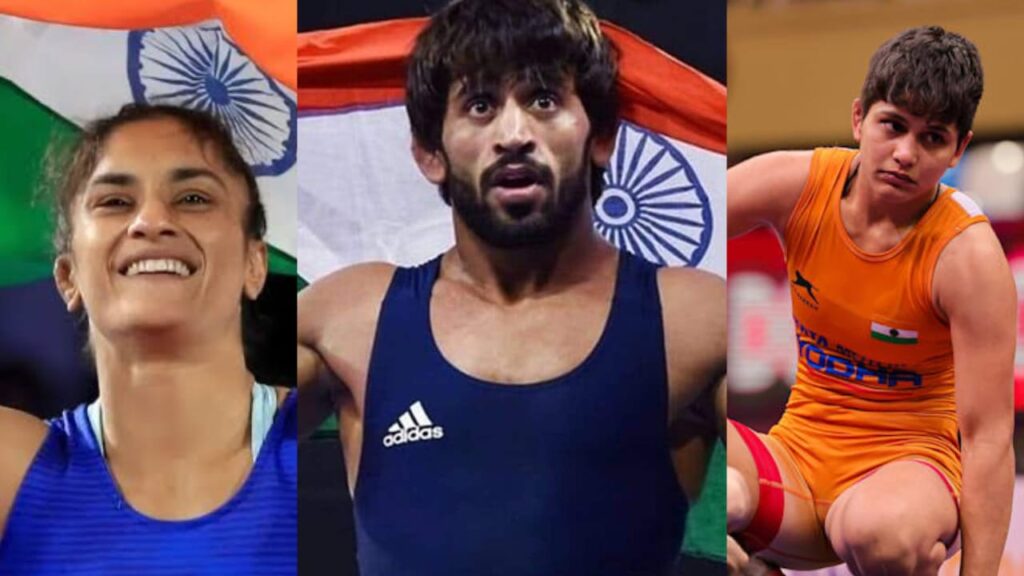The Delhi High Court on Saturday dismissed the writ petition filed by wrestlers Sujeet Kalkal and Antim Panghal, against the decision of the ad hoc committee, governing the beleaguered Wrestling Federation of India (WFI), to give Bajrang Punia and Vinesh Phogat direct entry to the Asian Games 2022 in Hangzhou by exempting them from the selection trials.
“This Court is not inclined to sit in appeal over the decision taken by the (Ad Hoc) Committee (running WFI) as the same cannot be said to be arbitrary or perverse,” noted Justice Subramonium Prasad in his verdict delivered on Saturday. The Court thus refused to interfere with the process of selecting the Indian Wrestling team for the Asian Games.
“It is neither the contention of the petitioners nor can it be said that the WFI has acted against the interest of the country or that the decision has been taken because of certain extraneous circumstances or in order to favour anyone,” he wrote. The Court’s decision not to alter the selection process will leave the ball in Bajrang Punia and Vinesh Phogat’s court, so to say.
As leading campaigners against the lack of transparency in the WFI, it would be up to them to emerge as heroes by withdrawing from the Asian Games squad and letting the winners of the trials be named in their place. Until a few days ago, neither had been in training since September 2022, and by stepping aside, they will only be putting the national interest ahead of all else.
It was apparent during the arguments on Friday that the High Court would focus primarily on whether the ad hoc committee was right in following a 2017 decision of the WFI to give the selectors the right to grant exemptions to some elite wrestlers, or if it had ignored a decision made at the WFI General Council in August 2022 to do away with exemptions.
Against the backdrop of two-time Olympic medalist Sushil Kumar dragging WFI to Court for not conducting trials but picking Narsingh Yadav for the 2016 Olympic Games, the WFI was moved in 2017 to lay down regulations for selection of wrestlers for participation in national camps and international events.
The regulations specified that for the Asian Games, the selection trials are mandatory in all weight categories. “However, the Selection Committee will have the discretion to select the iconic players like medallists of Olympics/World Championship without trials provided recommendation by Chief Coach/Foreign Expert,” it stated.
The WFI is said to have amended the stipulations in a General Council meeting on August 25, 2022, but the ad hoc committee, in an affidavit filed on Friday evening, claimed that the minutes of the meeting and the covering letter of September 7, 2022, were not in the records available with them.
That ad hoc committee also pointed out that on August 27, 2022, exemption was granted to Bajrang Punia, Ravi Dahiya and Deepak Punia for the World Wrestling Championship held from September 10, 2022, and therefore, it belied logic that if a decision was taken to not provide any exemption, no exemption would have been provided for the World Championship 2022.
While noting that Bajrang Punia (Men’s 66kg Freestyle) and Vinesh Phogat (Women’s 53kg) are world-renowned athletes, who are ranked in the top 10 in their respective categories, the court said it was not commenting upon the merits of the petitioners who have also excelled in the field of wrestling.
The court also said it would not take cognisance of the petitioners’ contention that Jagmander Singh, member of the Ad Hoc Committee and the Selection Committee, and Vijay Singh Dahiya, National Coach of the women’s Wrestling team, had claimed in newspaper reports and through e-mails that they had not made any recommendation to exempt any wrestler from trials.
“In view of the Status Report and the affidavit filed by WFI (Ad Hoc Committee), this Court is not giving credence to the alleged e-mails and the newspaper cuttings relied on by the learned Counsel for the Petitioner. It is well settled that Courts cannot place reliance on newspaper cuttings and e-mails etc. which do not always portray the correct picture,” the judgement said.




